Introduction
The long-range economic consequences, for the business community, of the COVID-19 crisis are currently unknown. Still, near-term HR decisions for many companies focus on hiring freezes, dismissals, layoffs, and reduced hours for both essential and non-essential workers. These actions fueled and driven by both across-the-board headcount actions, and proactive streamlining generally justify only the current business situation. How much upheaval these staffing decisions will leave in its wake is open to much speculation! After a return to ‘business as usual,’ the recruiting, developing, and retaining of top talent will again become a mission-critical initiative for businesses of all sizes, across all industries.
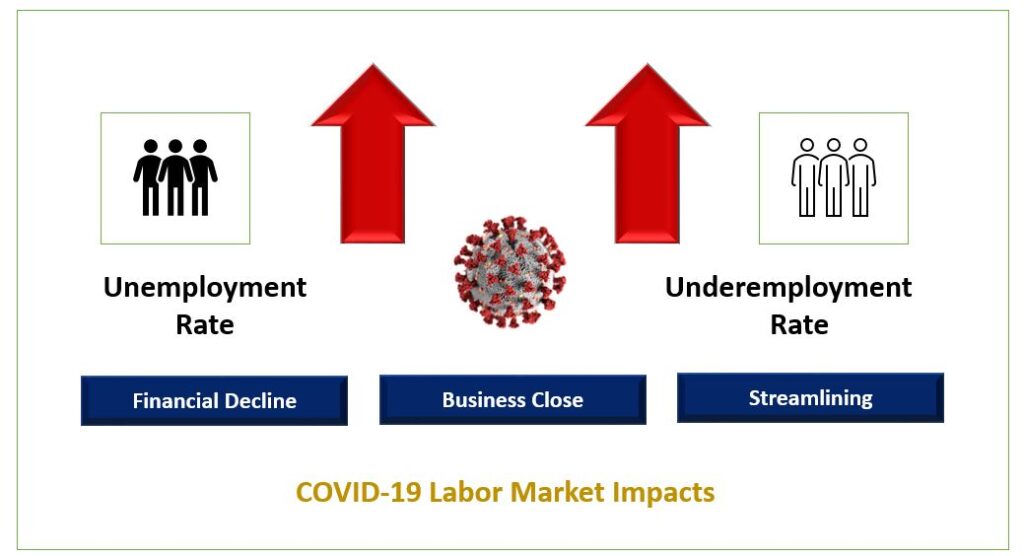
The reality is that COVID-19 is resulting in many businesses fighting to survive, and significant loss of employment and income for many workers. Lessons learned from the 2008 recession suggests that work-related obstructions will follow for some time, resulting in employee financial disruption.
There is a growing sentiment among leading business leaders and government officials about more job cuts as they warn about an extended coronavirus-induced economic downturn. In this unstable crisis atmosphere, highly-competent managers and workers possessing essential hard and soft skills are a precondition to surviving and prospering post-COVID-19.
“The relationship between workers and firms is valuable. Employers and workers typically spend a lot of time in finding a good “match,” and workers then acquire firm-specific skills and knowledge. If businesses lay off their workers during the lockdowns, those workers might start looking for other jobs, or they may leave the labor market altogether. That means that all that human capital will be lost. Once firms can reopen, they may have to start the process of finding and training workers again. This will also slow the recovery.”
The Brookings Institution
It is well-recognized that companies have specific hard skills requirements without which the employees would be at a loss to perform with the required proficiency. Soft skills, conversely, are less about the organizational role, and more about the social dynamics among individual workers, their supervisors, and colleagues working within a corporate culture and personality. The challenge to the management team is that these soft skills, previously learned as an expected element of growing up, are becoming dated as more and more interactions transpire within the decidedly depersonalized text, email, and social media facilities.
” The pandemic has only heightened the urgency of doubling down on skill-building, either to keep up with the speed of transformation now underway or to manage the particulars of working in new ways.”
McKinsey & Company
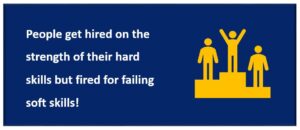
During the shutdown and impending business recovery, high levels of employee morale, motivation, and productivity will prove priceless in maintaining a cohesive and productive worker population. Employees that possess excellent soft skills will almost certainly be looking upon as the vital force in driving their colleagues to higher performance and help realize an earlier business upturn and return to profitability. At the same time, it is hopeful that employees without positive social behaviors are influenced and inspired to reskill with soft skills training.
The practical use of soft skills, in business recovery, should have a positive impact on improving governance, decision-making, workplace productivity, employee retention and loyalty, and job satisfaction. These outcomes translate into an improved return on employer investment for organizations with a calculated commitment to continually enrich their leadership and employee soft skill capacity.
Throughout the pandemic, companies will be well-served to smartly formulate resourcing plans with consideration of current and future projected operations, production, and customer services. These elements need proper positioning with worker roles and skills, responsibilities, and finance strategies. All changes to resourcing plans require alignment with the organization’s Employee Career Development Plans that serve as the foundation of employee morale, wellbeing, and loyalty.
“The future of work is inextricably linked to the future of learning. How we educate our youth translates into their preparedness as they enter the workforce. And how we retrain and upskill our existing workforce allows them to stay relevant in a changing work environment.”
Institute of the Future
Employee Career Development & Soft Skills
The Employee Career Development Plans consists of short and long-term goals to support employees’ current and future work roles and responsibilities progression and concomitant compensation. Included is a set of formal and informal learning and knowledge-building experiences to assist career plan achievement. The employees’ career goals need to support corporate culture and directly link with their current and planned hard, soft skills use, and proficiency.
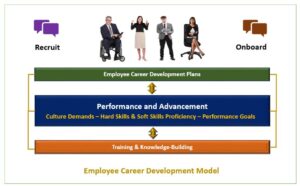
It will take a new breed of workers to prosper in the post-COVID-19 environment, one with a balance of hard skill competencies and soft skills. While hard skills can be natural to acquire in most occupational specialties, a soft skills gap can cause underlying problems for organizations that can genuinely impact productivity and profitability.
When the employee population has established soft skills that contribute to a productive and pleasing workplace, turnover is generally lower, and retaining top talent is a celebration of employee contentment and loyalty. When management ignores the value of soft skills, recruitment, and training performance typically decline. Employees who work for managers with weak soft skills are less engaged and negatively affect successful co-worker and customer interactions.
The Wall Street Journal reported that 92% of nearly 900 surveyed executives said soft skills were equally important or more important than technical skills, yet 89% said they have a very or somewhat difficult time finding employees with those soft skills.
Soft Skills Reemergence
A silver-lining to COVID-19 is that the crisis allows organizations to revisit traditional organizational roles and responsibilities and identify areas for employee behavioral improvement. Soft skills required to adapt effectively, communicate, be creative, problem-solve, and resolve conflicts, are vital for success as the workplace evolves socially and technologically. The ever-increasing velocity of new technologies is creating the infrastructure for the emergence of the modern workforce that will place a premium on employees with well-developed soft skills. This condition will lead to universal computerization of the workplace as the trajectory of repetitive task automation continues with the rapid adoption of AI and supporting technologies across all industries. These technological stimuli are changing how businesses operate from strategic decisions to tactical models, processes, practices, and offerings.
But do we fully understand the specific soft skills required for corporate success in this new and different work environment? There is a wide assortment of soft skills recognized, used, and proved useful throughout the business community. Random selection or use of the soft skill groups identified in articles and professional books seldom results in a personalized focus. Use of a Soft Skills Gap Analysis, described in a forward section, is a best practice approach for identifying the unique soft skills required for a particular organization.
Below is an example of a generic portfolio of excellent soft skills that can significantly influence the behaviors of managers and employees alike in turning around crisis management situations and sustaining a productive operating model. In real-life situations, human interactions are fluid and may require constant adjustment and concurrent or cohesive use of several of the soft skills below.
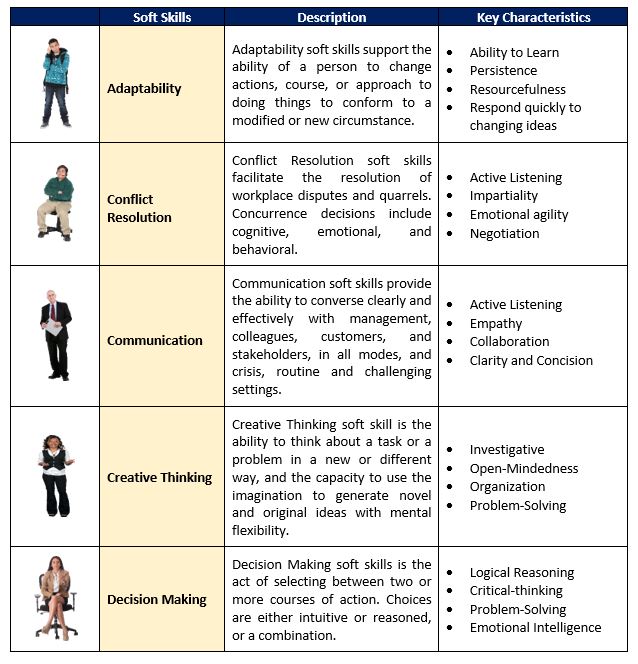
“Research conducted with Fortune 500 CEOs by the Stanford Research Institute International and the Carnegie Melon Foundation, found that 75% of long-term job success depends on people skills, while only 25% on technical knowledge.”
American Management Association
Soft Skills Benefits: Business and Employees
Employees are an organization’s principal asset, and talent investment is a mission-critical prerequisite to sustainable business success. Businesses go through extensive effort to recruit and employ qualified staff, but new hire skills learning is often not a priority after onboarding. This condition typically results in lower employee ROI and impacts their positive contribution to the business. Planned and dedicated skills training and development fosters proactive employee engagement and is a crucial catalyst to superior workplace performance.
Soft skills empower management and employees to collaborate and work together in harmony to meet business goals and objectives collectively. Effective employee use of soft skills, as demonstrated in workplace behaviors, generates value for both the business and workers.
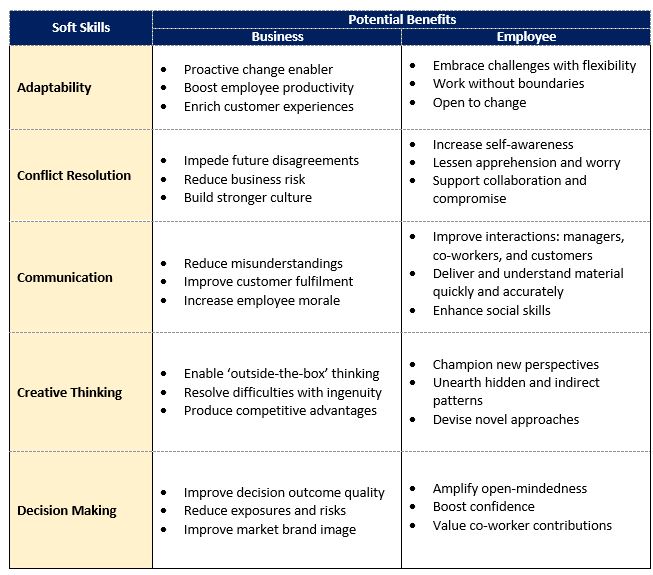
“We now have very hard evidence that you have to have soft skills in order to succeed.”
James Heckman, Economist and Nobel Laureate
Soft Skills Assessment
One of the most significant challenges organizations face in post-COVID-19 will be the ability to recruit, train, and retain top talent with the appropriate skills to handle indispensable leadership and professional job responsibilities. Future business success depends on a resilient workforce that can progress with changes in new innovative technologies and ways of work based in part on their accomplished hard and soft skills.
Today, many organizations assess soft skills informally with the collection of social cues detected during new hire interviews and workplace observation events. These practices may be problematic as perceptions are not predictive, and can often be instinctively biased with dependence on interview behavioral and situational questions. In this dynamic setting, companies need to elevate soft skills to the same priority as hard skills in the hiring process and employee performance reviews.
This change will require that HR policies and programs be appropriately updated to support the current state and value of soft skill abilities of new hire candidates as well as the performance of existing employees in a formalized and productive manner.
The starting point for determining the soft skills required for a company’s business success is performing a gap analysis of current employees’ soft skills capabilities with optimum worker best practices and associated behaviors. The deliverables include:
- An enterprise soft skills profile (baseline) of the unique organizational skills requirements.
- Schedule of current employees identified without the necessary soft skills that require initial or supplementary soft skills training.
- Structured criteria and roadmap for use in the valuation of new hire’s soft skills abilities.
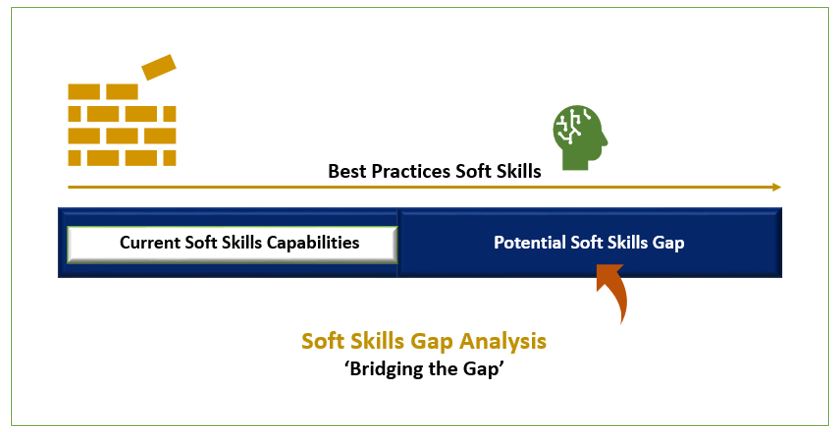
“Employees are a company’s greatest asset – they’re your competitive advantage. You want to attract and retain the best; provide them with encouragement, stimulus, and make them feel that they are an integral part of the company’s mission.”
Anne M. Mulcahy
New Hire Candidate Soft Skills Screening
The essential goal of performing new-hire soft skills screening is to identify those individuals with the most persuasive soft skill talents as they are the most likely to be long-term assets and top-performing employees. While the resume, cover letter, and initial screening offer a preliminary impression of a candidate’s soft skills, they do not provide a real indication of the individual’s behaviors in a dynamic business environment. The new hire process must include simulation of actual work scenarios to witness a candidate’s soft skills capabilities in different complex, conflict, and decision-making situations.
There is a wide array of new hire screening tools, some manual and more and more AI technology-driven. However, all new hire processes should include a formal face-to-face interview at an early stage and a concluding meeting at the go or no-go decision stage. A widely accepted concern is that inexperienced HR employees will make life easy for themselves by allowing technology to do the work and not trust analytical skills. In any case, it is well to remember that machines cannot yet provide the human element to decision-making.
“We need to reorient the way we recruit and hire people and train people based on skills descriptions not job descriptions.”
Deanna Mulligan
Hire Purpose: How Smart Companies Can Close the Skills Gap
Employee Soft Skills Monitoring
Soft skills represent an essential element of employees’ workplace behaviors and performance and need inclusion in periodic and annual performance reviews, after-action reports, and individual project evaluations. The soft skills baseline, created for the new hire process, should be the same for monitoring to maintain consistency on the soft skills required for employment and the ones actively monitoring during formal monitoring activities.
Soft skills assessment can take place through a variety of activities:
- Personal reflection and introspection.
- Co-worker role-based observations and feedback.
- Workplace behavior monitoring and evaluation.
Best practices discourage the sole use of traditional soft skills assessment approaches as they are generally too subjective to be practical. There are various competent AI-based assessment tools currently offered and successfully in use in the business community that support objective criteria. Organizations can select from an array of tools that provide for the evaluation of substantial groups of people with receipt of objective, data-driven measurements far more accurate than subjective practices. However, the inclusion of human-based observations and feedback activities will further increase the value of the monitoring output.
Outlined below is a collection of new hire screening and employee monitoring tools used to support soft skills identification, valuation, and rating activities.
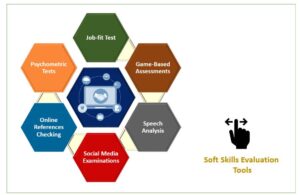
A study from LinkedIn and Capgemini highlights the growing need for soft skills in technology roles.
“The talent gap for soft skills to be greater than for hard skills, with experience in customer-centricity—an approach to doing business that focuses on creating a positive experience for the customer—being most in demand by companies.”
Society for Human Resource Management (SHRM)
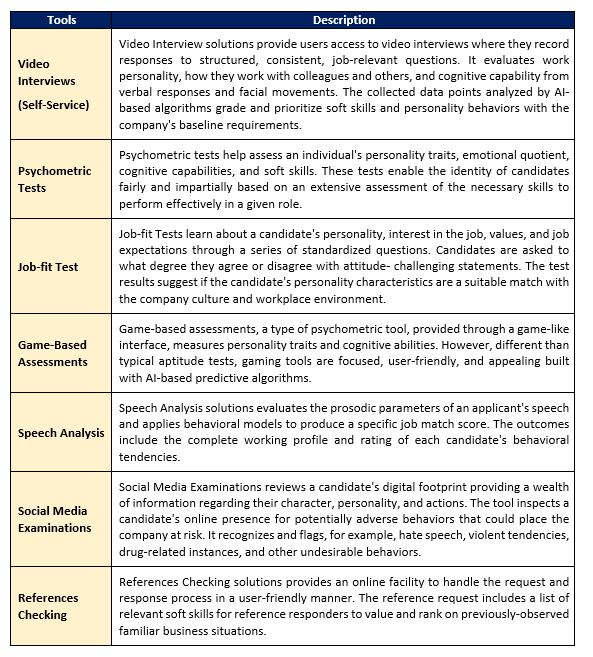
“Without continual growth and progress, such words as improvement, achievement, and success have no meaning.”
Benjamin Franklin
The Way Forward
At Knowledge Compass we bring together nearly four decades of thought leadership in business and technology strategy, the latest tools and best practices, and a seasoned consultant team with the competencies and talent to help our clients improve productivity and profitability of all enterprise business and support activities.
Knowledge Compass explores and develops valuable new insights from business, technology, and science by embracing the powerful technology of ideas and brainstorming. Our consultants engage customers in challenging discussion and experimentation to expand the boundaries of business science and practice and translate creative ideas into practical solutions from within and beyond business.
Working with Knowledge Compass means a collaborative approach to understanding your current business model, strategies, and key business requirements and goals.
We enable organizations to transform and deliver improved value by ensuring employees adapt and make the most effective use of changes in culture, strategy, infrastructure, and processing. Our consultants have a deep understanding and appreciation of the social and business factors that support the use of soft skills aligned with the corporate culture and personality and within employee career development plans.
Knowledge Compass provides consulting services with the use of an array of Frameworks, Analyses Tools, and Interactions from their Best Practices Consultant Toolbox.



0 Comments